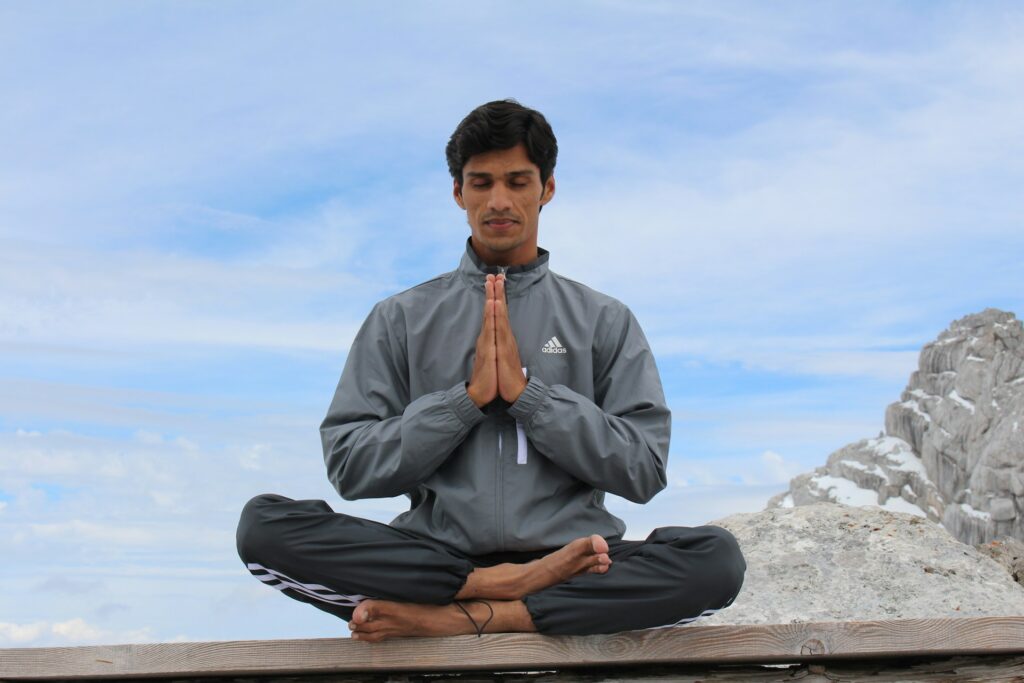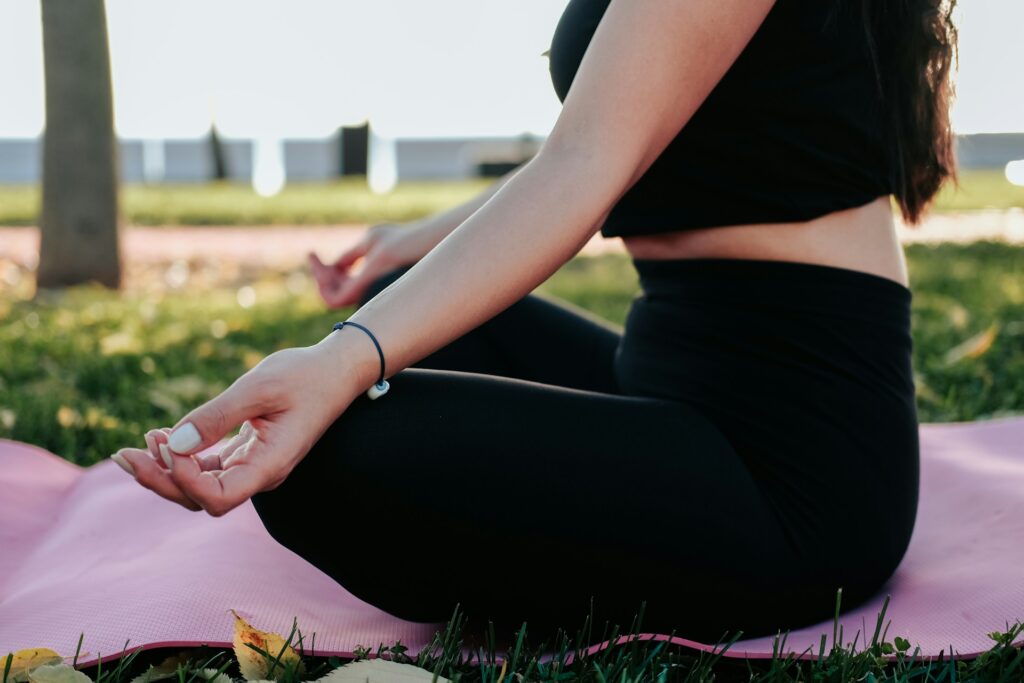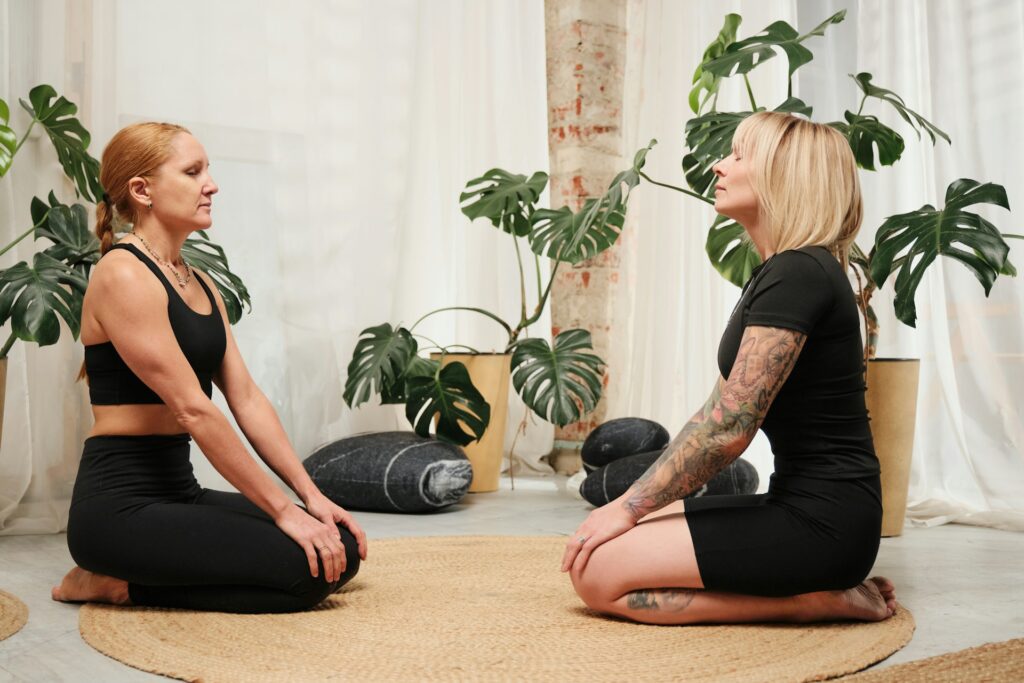Yoga isn’t just about flexibility or balance—it’s a full-body system that supports health on every level, from your nervous system to your digestion.

Practised consistently, it has the power to slow down signs of ageing and support long-term disease prevention in a way that feels sustainable, not extreme. You don’t have to be incredibly flexible or even overly fit to practise it, though you’ll certainly notice an improvement in these areas (and tons of others) if you start!
1. It lowers chronic stress, which slows the ageing process.

Stress is one of the fastest accelerators of biological ageing. It breaks down collagen, disrupts sleep, raises inflammation, and wears out your immune system. Yoga helps by calming the nervous system through movement, breath, and focus.
When you consistently practise yoga, your cortisol levels gradually decrease. That move into a more relaxed, parasympathetic state helps your body heal, reduces the risk of stress-related illness, and leaves your face and posture looking softer and more energised.
2. It improves circulation and oxygen delivery throughout the body.

A well-oxygenated body is a healthier one. Yoga supports circulation by lengthening and contracting muscles in sync with breath. This improves blood flow, helping cells regenerate more effectively. Better circulation means brighter skin, sharper focus, and stronger immunity. As time goes on, your organs function better, inflammation lowers, and you start to look and feel more energised from the inside out.
3. It supports lymphatic drainage and detoxification.

Unlike the bloodstream, your lymphatic system doesn’t have a pump—it relies on muscle movement to circulate. Yoga poses that twist, stretch, and invert the body help move lymph fluid, which carries waste out of your system. By helping the body process toxins more efficiently, yoga reduces internal stagnation. That makes a real difference when it comes to inflammation-related conditions and the subtle, underlying stress that contributes to illness over time.
4. It improves insulin sensitivity and blood sugar balance.

High blood sugar levels over time can lead to fatigue, skin ageing, weight gain, and diseases like diabetes. Yoga supports more balanced blood sugar by improving how your muscles respond to insulin and reducing the hormonal effects of stress eating.
Even gentle flows can stabilise blood sugar levels by increasing muscle glucose uptake and reducing cortisol. That balance doesn’t just prevent disease—it helps you avoid the energy crashes and cravings that make wellness feel like an uphill battle.
5. It boosts digestion and gut health.

Your gut plays a huge role in immunity, skin health, and even emotional regulation. Yoga can improve digestive function by reducing stress, stimulating the vagus nerve, and encouraging healthy peristalsis through gentle core work and twists.
Many people notice that consistent yoga reduces bloating, eases constipation, and lowers food-related discomfort. That alone can make your body feel lighter and younger, but it also has long-term health benefits by improving nutrient absorption and immune resilience.
6. It keeps joints mobile and inflammation low.

One of the biggest challenges with ageing is joint stiffness and inflammation. Yoga helps maintain joint mobility by moving synovial fluid through the joints, keeping cartilage nourished and reducing wear and tear.
By strengthening muscles around the joints and maintaining proper alignment, yoga helps prevent injuries and degenerative conditions like arthritis. It keeps you moving comfortably well into later life, which is one of the best definitions of youthfulness.
7. It strengthens your immune response as time goes on.

Regular yoga supports the immune system by lowering stress hormones, improving lymph circulation, and encouraging better sleep—all of which make your body more capable of fighting off viruses, bacteria, and cellular damage. That doesn’t mean you’ll never get sick, but it does mean your body will respond more quickly and recover more easily. Yoga gives your immune system the calm, steady environment it needs to function at its best.
8. It builds lean muscle and supports healthy bone density.

Muscle loss and declining bone strength are major contributors to physical ageing. Yoga—especially styles that include weight-bearing poses—helps maintain muscle mass and encourages the bones to stay strong and responsive. By holding poses like Warrior, Chair, or Plank, you’re engaging muscle groups and loading your bones gently but consistently. That strengthens your frame and reduces your risk of falls, fractures, and frailty down the line.
9. It improves posture and slows physical decline.

A slouched posture can make you feel and appear older than you are. Yoga brings attention to alignment and helps correct postural habits that contribute to stiffness, back pain, and the gradual shrinking effect many people experience with age. By strengthening the muscles that support the spine and releasing tension in the chest, hips, and neck, yoga helps you move taller, breathe deeper, and project more vitality with every step.
10. It supports deep, restorative sleep.

Poor sleep accelerates ageing by disrupting hormone balance, slowing cell repair, and increasing inflammation. Yoga helps improve sleep by calming the nervous system, lowering stress hormones, and training your body to wind down more easily at night.
Even a short practice before bed, focused on breath and gentle movement, can improve your ability to fall asleep and stay asleep. Over time, better sleep contributes to a stronger immune system, a brighter mood, and better resilience to stress.
11. It helps regulate hormones through nervous system balance.

Hormonal changes are a normal part of ageing—but when your nervous system is overloaded, those changes can feel more chaotic. Yoga helps regulate systems like the thyroid, adrenals, and reproductive hormones by improving overall nervous system tone.
Whether it’s through calming breathwork or stimulating specific organs with poses, yoga has been shown to reduce PMS symptoms, support menopause transitions, and improve metabolic balance—making hormonal changes feel more manageable and less disruptive.
12. It gives you a daily way to reconnect with yourself.

At its core, yoga is about awareness. The physical benefits are real, but what makes them sustainable is the way yoga brings you back into a conscious relationship with your body. You notice when something feels off. You pause before you push too far.
That ongoing conversation between you and your body is what leads to long-term vitality. You’re not outsourcing your health—you’re listening to your own signals. And when you trust those signals, you’re more likely to catch illness early, rest before burnout, and keep ageing gently rather than reactively.


